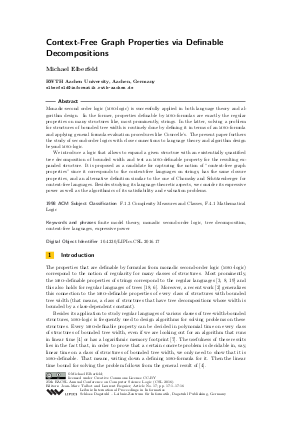Context-Free Graph Properties via Definable Decompositions
Author Michael Elberfeld
-
Part of:
Volume:
25th EACSL Annual Conference on Computer Science Logic (CSL 2016)
Part of: Series: Leibniz International Proceedings in Informatics (LIPIcs)
Part of: Conference: Computer Science Logic (CSL) - License:
 Creative Commons Attribution 3.0 Unported license
Creative Commons Attribution 3.0 Unported license
- Publication Date: 2016-08-29
File

PDF
LIPIcs.CSL.2016.17.pdf
- Filesize: 460 kB
- 16 pages
Document Identifiers
Subject Classification
Keywords
- finite model theory
- monadic second-order logic
- tree decomposition
- context-free languages
- expressive power
Metrics
- Access Statistics
-
Total Accesses (updated on a weekly basis)
0PDF Downloads0Metadata Views
Abstract
Monadic-second order logic (MSO-logic) is successfully applied in both language theory and algorithm design. In the former, properties definable by MSO-formulas are exactly the regular properties on many structures like, most prominently, strings. In the latter, solving a problem for structures of bounded tree width is routinely done by defining it in terms of an MSO-formula and applying general formula-evaluation procedures like Courcelle's. The present paper furthers the study of second-order logics with close connections to language theory and algorithm design beyond MSO-logic. We introduce a logic that allows to expand a given structure with an existentially quantified tree decomposition of bounded width and test an MSO-definable property for the resulting expanded structure. It is proposed as a candidate for capturing the notion of "context-free graph properties" since it corresponds to the context-free languages on strings, has the same closure properties, and an alternative definition similar to the one of Chomsky and Schützenberger for context-free languages. Besides studying its language-theoretic aspects, we consider its expressive power as well as the algorithmics of its satisfiability and evaluation problems.
Cite As Get BibTex
Michael Elberfeld. Context-Free Graph Properties via Definable Decompositions. In 25th EACSL Annual Conference on Computer Science Logic (CSL 2016). Leibniz International Proceedings in Informatics (LIPIcs), Volume 62, pp. 17:1-17:16, Schloss Dagstuhl – Leibniz-Zentrum für Informatik (2016)
https://doi.org/10.4230/LIPIcs.CSL.2016.17
BibTex
@InProceedings{elberfeld:LIPIcs.CSL.2016.17,
author = {Elberfeld, Michael},
title = {{Context-Free Graph Properties via Definable Decompositions}},
booktitle = {25th EACSL Annual Conference on Computer Science Logic (CSL 2016)},
pages = {17:1--17:16},
series = {Leibniz International Proceedings in Informatics (LIPIcs)},
ISBN = {978-3-95977-022-4},
ISSN = {1868-8969},
year = {2016},
volume = {62},
editor = {Talbot, Jean-Marc and Regnier, Laurent},
publisher = {Schloss Dagstuhl -- Leibniz-Zentrum f{\"u}r Informatik},
address = {Dagstuhl, Germany},
URL = {https://drops.dagstuhl.de/entities/document/10.4230/LIPIcs.CSL.2016.17},
URN = {urn:nbn:de:0030-drops-65575},
doi = {10.4230/LIPIcs.CSL.2016.17},
annote = {Keywords: finite model theory, monadic second-order logic, tree decomposition, context-free languages, expressive power}
}
Author Details
References
- Isolde Adler, Martin Grohe, and Stephan Kreutzer. Computing excluded minors. In Proceedings of the 19th Annual ACM/SIAM Symposium on Discrete Algorithms (SODA 2008), pages 641-650. SIAM, 2008. URL: http://dl.acm.org/citation.cfm?id=1347082.1347153.
-
Mikołaj Bojańczyk and Michał Pilipczuk. Definability equals recognizability for graphs of bounded tree width. In Proceedings of the 30th Annual ACM/IEEE Symposium on Logic in Computer Science (LICS 2016). IEEE Computer Society, 2016. to appear.

-
J. Richard Büchi. Weak second-order arithmetic and finite automata. Math. Logic Quart., 6(1-6):66-92, 1960.

-
Bruno Courcelle. Graph rewriting: An algebraic and logic approach. In Handbook of Theoretical Computer Science, Volume B, pages 193-242. Elsevier and MIT Press, 1990.

- Bruno Courcelle and Joost Engelfriet. Graph structure and monadic second-order logic, a language theoretic approach. Cambridge University Press, 2012. URL: http://hal.archives-ouvertes.fr/hal-00646514/fr/.
- John Doner. Tree acceptors and some of their applications. Journal of Computer and System Sciences, 4(5):406-451, 1970. URL: http://dx.doi.org/10.1016/S0022-0000(70)80041-1.
- Michael Elberfeld, Andreas Jakoby, and Till Tantau. Logspace versions of the theorems of bodlaender and courcelle. In Proceedings of the 51st Annual IEEE Symposium on Foundations of Computer Science (FOCS 2010), pages 143-152, 2010. URL: http://dx.doi.org/10.1109/FOCS.2010.21.
- Calvin C. Elgot. Decision problems of finite automata design and related arithmetics. Transactions of the American Mathematical Society, 98(1):21-51, 1961. URL: http://dx.doi.org/10.2307/1993511.
- Joost Engelfriet and Erik Meineche Schmidt. IO and OI. I. Journal of Computer and System Science, 15(3):328-353, 1977. URL: http://dx.doi.org/10.1016/S0022-0000(77)80034-2.
- Jörg Flum and Martin Grohe. Parameterized Complexity Theory. Springer, 2006. URL: http://dx.doi.org/10.1007/3-540-29953-X.
- Martin Grohe. Fixed-point definability and polynomial time on graphs with excluded minors. Journal of the ACM, 59(5):27:1-27:64, 2012. URL: http://dx.doi.org/10.1145/2371656.2371662.
- Martin Grohe and Stephan Kreutzer. Methods for algorithmic meta theorems. In Model Theoretic Methods in Finite Combinatorics, volume 558 of Contemporary Mathematics, pages 181-206. American Mathematical Society, 2011. URL: http://www.automata.rwth-aachen.de/~grohe/pub/grokre11.pdf.
-
Michael A. Harrison. Introduction to Formal Language Theory. Addison-Wesley, 1978.

-
Clemens Lautemann, Thomas Schwentick, and Denis Thérien. Logics for context-free languages. In Proceedings of CSL 1994, volume 933, pages 205-216. Springer, 1995.

- Leonid Libkin. Elements Of Finite Model Theory. Springer, 2004. URL: http://dx.doi.org/10.1002/malq.19600060105.
- J. Mezei and J.B. Wright. Algebraic automata and context-free sets. Inform. and Control, 11(1-2):3-29, 1967. URL: http://dx.doi.org/10.1016/S0019-9958(67)90353-1.
- D. Seese. The structure of the models of decidable monadic theories of graphs. Annals of pure and applied logic, 53(2):169-195, 1991. URL: http://dx.doi.org/10.1016/0168-0072(91)90054-P.
- J. W. Thatcher and J. B. Wright. Generalized finite automata theory with an application to a decision problem of second-order logic. Mathematical Systems Theory, 2(1):57-81, 1968. URL: http://dx.doi.org/10.1007/BF01691346.
-
Boris Avraamovich Trakhtenbrot. Finite automata and logic of monadic predicates. Doklady Akademii Nauk SSSR, 140:326-329, 1961. In Russian.

- Moshe Y. Vardi. The complexity of relational query languages (extended abstract). In Proceedings of the 14th annual ACM symposium on Theory of computing (STOC 1982), pages 137-146. ACM, 1982. URL: http://dx.doi.org/10.1145/800070.802186.
